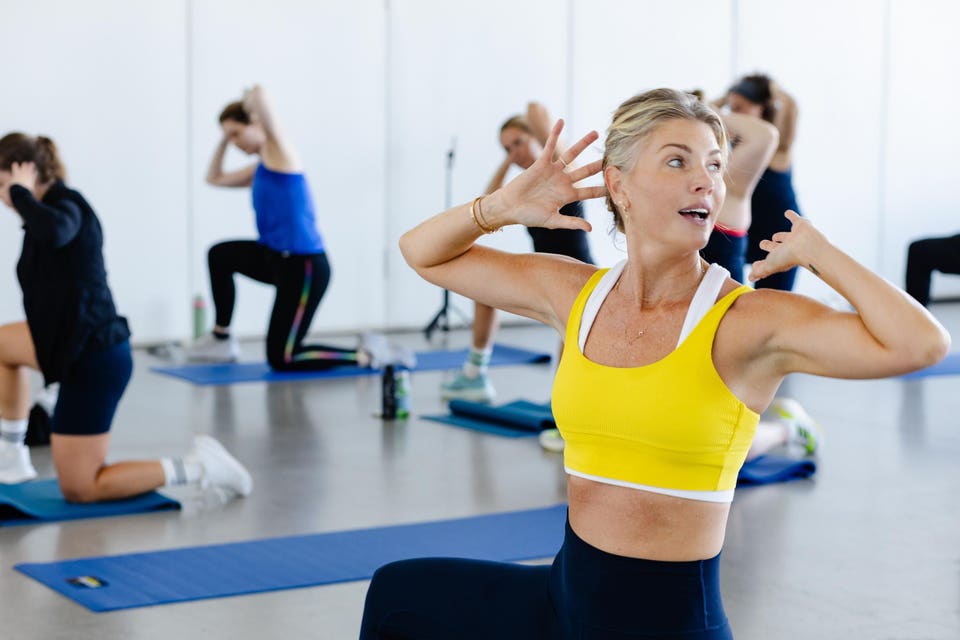Amanda Kloots, the dancer, fitness instructor, and former co-host of the television show The Talk, is on a mission to reshape how society perceives pain and recovery. Having experienced significant personal challenges, including a C-section in 2019, Kloots now emphasizes the importance of recognizing pain as a vital part of the healing process. She has partnered with Advil to launch The Strength Shift, a campaign aimed at redefining what true strength means in the context of health and fitness.
Kloots believes that traditional notions, such as “no pain, no gain,” often misrepresent strength. During a recent conversation in New York City, she stated, “Strength should be more about acknowledging the pain, and shifting whatever you are doing.” This shift in mindset is particularly relevant as many individuals push through discomfort without understanding its implications. Kloots reflected on her journey, noting, “It wasn’t until the last couple of years that I have taken stock of my body and when I need to pay attention and not push through pain.”
The transformative experience of her first surgery made her reconsider her approach to fitness and wellness. C-sections, which involve surgical incisions to deliver a baby, can be physically taxing and require substantial recovery time. Kloots emphasized that she was forced to rest for six weeks post-surgery, which was a pivotal moment in her understanding of personal limits and recovery needs.
Pain serves an essential purpose as part of the body’s warning system. It signifies when something is wrong, whether due to inflammation, tissue damage, or fractures. Kloots explained, “Your body will often tell you when something’s wrong. You can end up ignoring a lot of things in your body. We all do.” Recognizing pain and other physical signals can guide individuals to reassess their training routines and overall health strategies.
Kloots elaborated on the importance of incorporating recovery into any fitness regimen. She likened constant training without rest to running a dishwasher continuously, suggesting that without breaks, the body will inevitably break down. Recovery is not just a luxury but a necessity for growth. For instance, after lifting weights, micro-tears occur in muscles, which can lead to soreness. Yet, when given adequate time to heal, these muscles strengthen and grow.
The concept of recovery extends to mental health as well. Kloots noted that many overlook the mental toll of rigorous training, often leading to burnout without proper recovery strategies. She advocates for a holistic approach that includes rest, rejuvenation, hydration, and proper nutrition. “The key is acknowledging these things,” she said, referring to pain, energy levels, and sleep quality.
In her own routine, Kloots schedules rest days, typically reserving Sundays to spend time with her son, which allows her muscles to recover. She also incorporates activities like sauna sessions and cold plunges into her recovery process. Kloots encourages others to redefine their understanding of recovery. “People can be fearful of acknowledging pain because they think it means that they have to stop doing what they do,” she explained. “But it doesn’t necessarily mean that. You can work other parts of the body, keep moving and stay active.”
Kloots shared her experience of recovering from a shoulder injury sustained while boxing. She managed the pain with anti-inflammatories while continuing to engage in lower body exercises, demonstrating her commitment to a balanced approach to fitness. Her varied physical activities include tennis, boxing, dance, and jump roping, allowing her to maintain a broad fitness routine.
As part of The Strength Shift, Kloots developed a resilience-building workout that integrates various low-impact strength-building exercises with cardio components. This workout is accessible at Tone House, and Kloots emphasized its adaptability for individuals with different fitness levels.
Additionally, Kloots encourages a mindset shift towards gratitude for the body’s capabilities. Reflecting on her past, she noted, “It used to be that a good workout was at least three hours. My whole mindset has shifted. Now, post-COVID, I am 43 and so grateful for the strength in my body.”
Acknowledging the challenges of maintaining this perspective in a fast-paced world, she remarked that distractions from daily life can hinder focus on health. “It can be hard to block all that out. You can always be in survival mode, fight or flight,” Kloots stated, highlighting the importance of intentional mindfulness in one’s fitness journey.
Looking forward, Kloots remains active and continues to expand her ventures. She launched a supplement company called Proper Health in January 2025 and is set to appear in a reality television show this coming January. Through The Strength Shift, Amanda Kloots is not only advocating for a new understanding of strength and recovery but also exemplifying how a shift in mindset can lead to a more fulfilling life.
